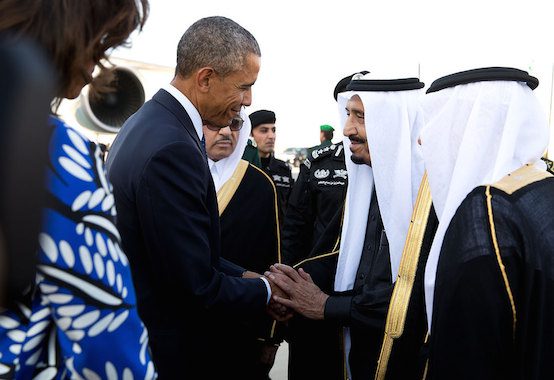How the U.S. Should Handle Its Reckless Clients

Aaron David Miller and Richard Sokolsky offer the next president some suggestions on what not to do in the Middle East. This one made a lot of sense:
Seventh, don’t let our allies and friends “guilt” us into deepening our security commitments in the region and using force to solve what are essentially political problems—and problems that can only be solved by Arab governments—by raising doubts about America’s credibility. What these countries really want is for Uncle Sucker to take care of problems that are either of their own making or that do not implicate U.S. core interests in the region. Saudi Arabia should have been thanking the Obama administration for eliminating the threat of a nuclear Iran for at least the next 10-15 years. Instead, to reassure the Saudis of the credibility of the American security commitment and mollify their anger over the Iran agreement, Washington allowed itself to become the Kingdom’s enabler-in-chief for their woeful misadventure in Yemen.
U.S. support for the indefensible war on Yemen has often been explained as a way of appeasing the Saudis and their allies in response to the nuclear deal with Iran, but this has always struck me as more of a lame excuse than a real reason. The nuclear deal imposes significant restrictions on Iran’s nuclear program, which clearly benefits Iran’s regional rivals. Even if the Saudis and the other Gulf states don’t see it that way, the U.S. didn’t need to placate them to conclude the nuclear deal, and their opposition to it would not have prevented the deal from being completed. The U.S. didn’t need to placate them, and it still doesn’t need to do that, but for other reasons has chosen to do so. The Obama administration backed an unnecessary war as part of an unnecessary bargain with bad clients, and it continues to do so nineteen months after the start of the Saudi-led intervention.
The trap that Miller and Sokolsky describe is one that the U.S. repeatedly falls into with its clients, especially those in that part of the world. When a client state wants the U.S. to do what it wants and to align its regional policies completely with theirs, the correct response is to refuse to cater to their preferences and to pursue U.S. goals even when they may conflict with what the client wants. When our interests and the interests of clients diverge, the U.S. shouldn’t privilege the latter or subordinate U.S. priorities to theirs. If that prompts a round of whining about being “abandoned,” there should be no rush to “reassure” them that the U.S. will always support them. Instead, Washington should use that as an opportunity to remind them that the client is the one that needs to prove its usefulness to us and not vice versa. The U.S. should never find itself in a position where it indulges destructive behavior from clients in order to demonstrate that it can be relied on. Rather, it is the client that needs to avoid reckless and destructive actions to prove their value to the U.S. The burden is on the client to prove that the relationship is worth continuing, and the U.S. should be willing and ready to downgrade or end that relationship when the client becomes too much of a liability. In general, the U.S. should be much less anxious about “losing” bad client states around the world than it has been, and the clients should be much more worried about losing U.S. backing than they are.
Comments